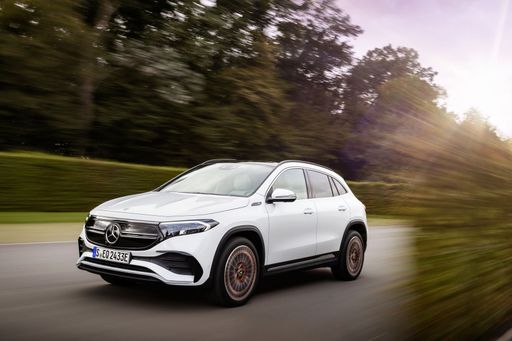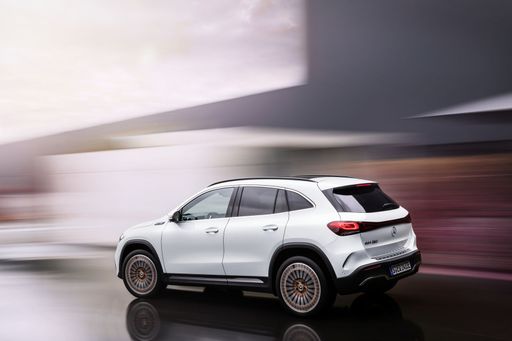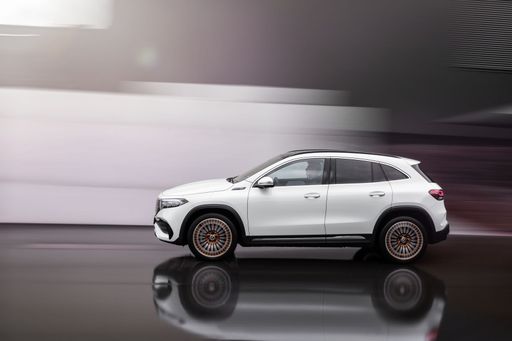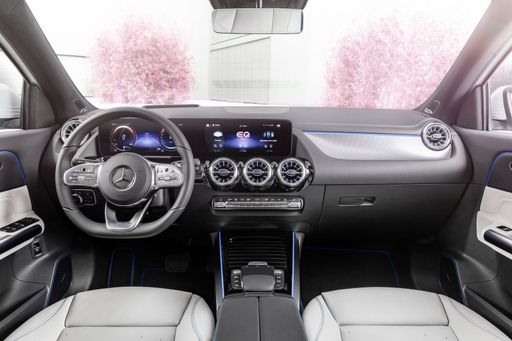Mercedes EQA vs Peugeot 208 - Differences and prices compared
Compare performance (292 HP vs 156 HP), boot space and price (44200 £ vs 20700 £) at a glance. Find out which car is the better choice for you – Mercedes EQA or Peugeot 208?
Costs and Efficiency:
Price and efficiency are key factors when choosing a car – and this is often where the real differences emerge.
Peugeot 208 has a decisively advantage in terms of price – it starts at 20700 £, while the Mercedes EQA costs 44200 £. That’s a price difference of around 23555 £.
In terms of energy consumption, the advantage goes to the Peugeot 208: with 14.10 kWh per 100 km, it’s barely noticeable more efficient than the Mercedes EQA with 14.40 kWh. That’s a difference of about 0.30 kWh.
As for range, the Mercedes EQA performs distinct better – achieving up to 561 km, about 129 km more than the Peugeot 208.
Engine and Performance:
Under the bonnet, it becomes clear which model is tuned for sportiness and which one takes the lead when you hit the accelerator.
When it comes to engine power, the Mercedes EQA has a clearly edge – offering 292 HP compared to 156 HP. That’s roughly 136 HP more horsepower.
In acceleration from 0 to 100 km/h, the Mercedes EQA is noticeable quicker – completing the sprint in 6 s, while the Peugeot 208 takes 8.30 s. That’s about 2.30 s faster.
In terms of top speed, the Peugeot 208 performs to a small extent better – reaching 200 km/h, while the Mercedes EQA tops out at 160 km/h. The difference is around 40 km/h.
There’s also a difference in torque: Mercedes EQA pulls convincingly stronger with 520 Nm compared to 270 Nm. That’s about 250 Nm difference.
Space and Everyday Use:
Cabin size, boot volume and payload all play a role in everyday practicality. Here, comfort and flexibility make the difference.
Both vehicles offer seating for 5 people.
In curb weight, Peugeot 208 is decisively lighter – 1165 kg compared to 2045 kg. The difference is around 880 kg.
In terms of boot space, the Peugeot 208 offers hardly perceptible more room – 352 L compared to 340 L. That’s a difference of about 12 L.
In maximum load capacity, the Mercedes EQA performs to a small extent better – up to 1320 L, which is about 157 L more than the Peugeot 208.
When it comes to payload, Peugeot 208 hardly perceptible takes the win – 430 kg compared to 425 kg. That’s a difference of about 5 kg.
Who comes out on top?
Overall, the Mercedes EQA shows itself to be edges ahead and secures the title of DriveDuel Champion.
It convinces with the more balanced overall package and proves to be the more versatile choice for everyday use.

Mercedes EQA
Costs and Consumption
View detailed analysis
Engine and Performance
View detailed analysis
Dimensions and Body
View detailed analysis
Mercedes EQA
The Mercedes EQA slips into the electric crossover ranks with the brand’s familiar luxury polish, offering a quiet, fuss-free drive that feels perfectly at home in the city or on a country escape. Inside it’s neatly finished and tech-forward, projecting grown-up refinement even if it plays things a bit safe for anyone chasing outright excitement.
details



Peugeot 208
The Peugeot 208 feels like a city-savvy fox: compact, stylish and surprisingly grown-up, with a cabin that punches above its weight and enough personality to make daily commutes a little less boring. It’s a smart pick for buyers who want chic practicality without the showroom bluster — easy to park, thrifty to run and oddly fun when the road tightens up.
details




|

|
|
|
|
Costs and Consumption |
|
|---|---|
|
Price
44200 - 57400 £
|
Price
20700 - 35200 £
|
|
Consumption L/100km
-
|
Consumption L/100km
4.5 - 5.2 L
|
|
Consumption kWh/100km
14.4 - 16.9 kWh
|
Consumption kWh/100km
14.1 - 15.4 kWh
|
|
Electric Range
476 - 561 km
|
Electric Range
362 - 432 km
|
|
Battery Capacity
70.50 kWh
|
Battery Capacity
46 - 51 kWh
|
|
co2
0 g/km
|
co2
0 - 117 g/km
|
|
Fuel tank capacity
-
|
Fuel tank capacity
44 L
|
Dimensions and Body |
|
|---|---|
|
Body Type
SUV
|
Body Type
Hatchback
|
|
Seats
5
|
Seats
5
|
|
Doors
5
|
Doors
5
|
|
Curb weight
2045 - 2115 kg
|
Curb weight
1165 - 1530 kg
|
|
Trunk capacity
340 L
|
Trunk capacity
309 - 352 L
|
|
Length
4463 mm
|
Length
4055 mm
|
|
Width
1834 mm
|
Width
1745 mm
|
|
Height
1608 - 1613 mm
|
Height
1430 mm
|
|
Max trunk capacity
1320 L
|
Max trunk capacity
1118 - 1163 L
|
|
Payload
425 kg
|
Payload
380 - 430 kg
|
Engine and Performance |
|
|---|---|
|
Engine Type
Electric
|
Engine Type
Petrol, Electric, Petrol MHEV
|
|
Transmission
Automatic
|
Transmission
Manuel, Automatic
|
|
Transmission Detail
Reduction Gearbox
|
Transmission Detail
Manual Gearbox, Reduction Gearbox, Dual-Clutch Automatic
|
|
Drive Type
Front-Wheel Drive, All-Wheel Drive
|
Drive Type
Front-Wheel Drive
|
|
Power HP
190 - 292 HP
|
Power HP
101 - 156 HP
|
|
Acceleration 0-100km/h
6 - 8.6 s
|
Acceleration 0-100km/h
8.3 - 10.9 s
|
|
Max Speed
160 km/h
|
Max Speed
150 - 200 km/h
|
|
Torque
385 - 520 Nm
|
Torque
205 - 270 Nm
|
|
Number of Cylinders
-
|
Number of Cylinders
3
|
|
Power kW
140 - 215 kW
|
Power kW
74 - 115 kW
|
|
Engine capacity
-
|
Engine capacity
1199 cm3
|
General |
|
|---|---|
|
Model Year
2024 - 2025
|
Model Year
2023 - 2025
|
|
CO2 Efficiency Class
A
|
CO2 Efficiency Class
D, A, C
|
|
Brand
Mercedes-Benz
|
Brand
Peugeot
|
Is the Mercedes EQA offered with different drivetrains?
Available configurations include Front-Wheel Drive or All-Wheel Drive.
The prices and data displayed are estimates based on German list prices and may vary by country. This information is not legally binding.
